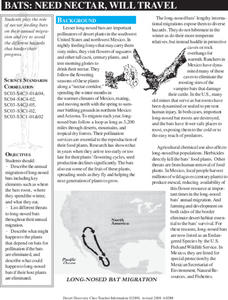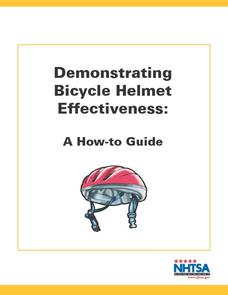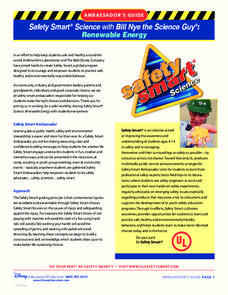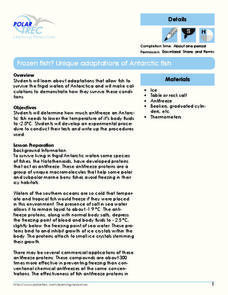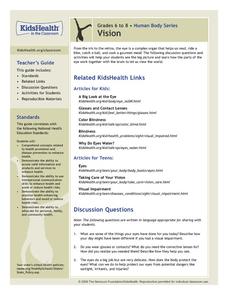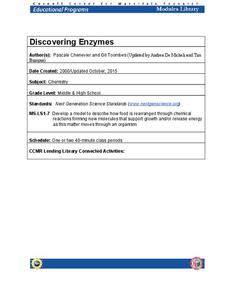Curated OER
Growing in Communities, Kids on the Grow
Students participate in an after school program that promotes concern for others, recognizing differences, accepting differences, leadership roles, mentoring, self-responsibility and personal safety. They explore the diversity of their...
Curated OER
Consuming Healthy Snacks
Get your class into great shape by introducing them to the benefits of eating healthy snacks and engaing in regular exercise. This set of activities comes with all the worksheets and handouts needed to complete several weeks of nutrition...
Curated OER
Bats: Need Nectar, Will Travel
Beginning wildlife biologists become adult bats, baby bats, snakes, owls, bobcats, or land-clearing developers in a grand role-playing activity. In a large open space, they play a game in which they move to designated areas based on what...
National Highway Traffic Safety Administration
Demonstrating Bicycle Helmet Effectiveness
A well-fitting helmet can be the difference between an unfortunate bicycle accident and a tragic bicycle accident. Encourage your class to exercise bike safety with a set of lessons that demonstrate the importance of wearing a helmet,...
Disney
Renewable Energy
Bring some energy to your physical science curriculum with this engaging Bill Nye the Science Guy lesson. Based on his Renewable Energy video, students explore the concepts of potential and kinetic energy and learn how they are applied...
Polar Trec
Frozen Fish? Unique Adaptations of Antarctic Fish
Some fish contain proteins that act like antifreeze in order for them to live in the frigid waters of Antarctica! High schoolers determine how much antifreeze a fish needs to lower its body temp to -2.5 degrees. Teachers act as a...
Nemours KidsHealth
Vision
From the iris and retina to glasses and contact lenses, learners will be excited to see what activities are in store for them as they learn about the complex organ of the human eye.
Baylor College
Calculating Exponential Growth
There can be a steep learning curve when teaching about exponential growth, but the lesson helps kids make sense out of the concept. When talking about exponential growth of viruses, learners may not be very interested, but when you are...
Baylor College
Modeling an HIV Particle
Models are an important part of science; they help us see the world on a scale that works for us. In the first of five lessons on HIV, learners make a paper model of the HIV virus that is about 500,000 times larger than the actual virus....
Baylor College
HIV/AIDS in the United States
In the final of five lessons about HIV/AIDS, groups create presentations to share data about the infection rates in the United States, examining demographic and geographic trends over the past ten years. Depending on how much time you...
Read4Health
Piggybook: A Read4Health Lesson Plan
"You are pigs." With those three simple words, the lives of the Piggott family were changed forever. Read aloud the children's story Piggybook by Anthony Browne and teach your class the importance of personal responsibility, learning...
Outdoor Learning Center
Outdoor Survival
Which of the following can you survive without for the longest time: water, food, or a positive mental attitude? The answer may surprise you. Guide learners of all ages through games, activities, and discussions about surviving in the...
Cornell University
Discovering Enzymes
Explore the function of enzymes through a series of lab investigations. Learners use household enzymes such as hydrogen peroxide to model the role of enzymes. The enzymes break down proteins with and without a catalyst.
PBS
Stories of Painkiller Addiction: Decisions and Consequences
Teach young learners that most drug addictions end in one of three outcomes: treatment, jail, or death. After watching a short video segment on the consequences of drug abuse, class members discuss what they viewed and consider what...
Curated OER
California Fights Sugar
Scholars read articles and have a class discussion on California's efforts to fight obesity. They will read and discuss the effects of sugar on the body and the soda tax that is being proposed in California.
Curated OER
Crystal Growing
Students grow crystals and document their observations by recording timeing and growth. Additional characteristics of crystals are observed under a black light, by growing under different conditions and mineral content is determined.
Curated OER
Children of Alcoholics Group
Ninth graders identify characteristics of alcoholism, resources available to them and their family within the community and school, and look at strategies to help them increase safety and anger management strategies too.
Curated OER
Biomedical Devices for the Eyes
Young scholars study the structures of the human eye. In this eye device lesson students examine different eye problems and devices that can help to resolve them.
Baylor College
Making Copies of an HIV Particle
In the second of five lessons about HIV, discover the mechanisms that allow the HIV virus to replicate. Using the models that they created the day before, learners examine the parts of the virus particle. The lesson plan does not say...
Curated OER
Safe and Sanitary Work Habits - Level 1
Students brainstorm hazards in the kitchen, and categorize them. They develop a checklist that could be used by an inspector to evaluate a home economics foods laboratory. They create a recipe while using proper lab and safety procedures.
Curated OER
Defining Hazardous Waste
Learners examine the relationship between hazardous substances and hazardous waste. They identify toxic chemicals and how they are disposed of. They work together to answer questions about how they are improperly used.
Curated OER
Floodplain Modeling
Students simulate the impact of fluctuating river volumes on structures and landforms. They experiment with table top-sized riverbed models and water. Students consider how human design can help mitigate the effects of a flood.
Curated OER
How Hot Is Hot In Namib?
Students research and demonstrate the temperatures of the Namibian Desert. They watch and discuss a video, conduct an experiment to demonstrate the desert temperatures, record their results in the form of a graph, and compare/contrast...
Curated OER
Surviving Extremes
Students examine the potential health dangers of mountain climbing in high altitudes and deep-sea diving. They write a health and safety column for a fictional magazine about extreme outdoor sports that explains the risks involved in...
Other popular searches
- Safety and Injury Prevention
- Injury Prevention Safety
- Prevention of Injury
- Injury Prevention Primary
- Safety, Injury Prevention
- First Aid Injury Prevention
- Injury Prevention and Sport
- Injury Prevention Bikes
- Art Injury Prevention
- Pe Injury Prevention
- Sports Injury Prevention




